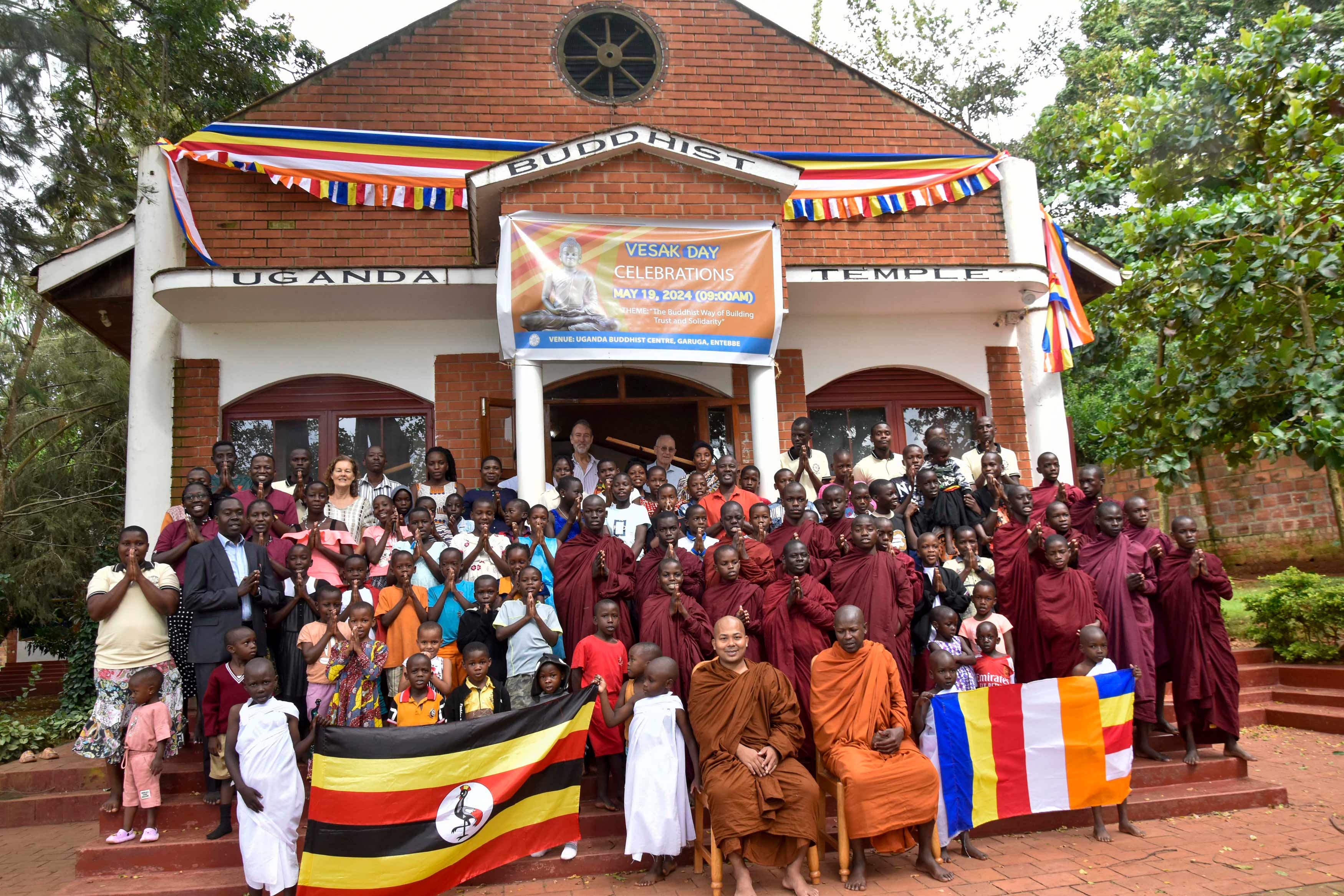Celebrating Vesak: Building Trust and Solidarity in Today’s World

On Sunday, May 19, 2024, we gathered to celebrate Vesak, a significant day that commemorates the birth, enlightenment, and passing away of the Buddha. This year, we embraced the United Nations Vesak theme, “The Buddhist Way of Building Trust and Solidarity.” The celebrations were led by Bhante Pandicca and Venerable Sangharakkhita, who guided us through a series of meaningful activities and teachings. The celebrations were joined by members from the surrounding villages, our Buddhist community and children from neighboring villages.
Bhante Pandicca, in his insightful speech, elaborated on the reasons behind celebrating Vesak. He explained that this day is not just a reminder of the historical events of the Buddha’s life but also an opportunity to reflect on his universal teachings. He also emphasized the practice and embodiment of ethical behavior as the basis of building trust in the world. When we embody the five precepts, we establish the foundation for a good quality of life, fostering trust among each other and create a harmonious and just world.
Another highlight of the celebration was the watering ceremony of the Bodhi tree, led by Bhante Pandicca. He shared that the act of watering the Bodhi tree symbolizes nurturing our spiritual growth and connection to the Buddha’s enlightenment. Just as the tree needs water to thrive, we need the Buddha’s teachings to cultivate inner peace and wisdom.








Building Trust and Solidarity
Today, though the technological and scientific innovations have connected people, it is also true that there is a big divide among people. There is mistrust with not only information, but also other dealings. Trust and solidarity are more crucial than ever. The challenges we face, from social inequalities to global crises, require collective action and mutual support. Trust is the glue that holds societies together, enabling cooperation and understanding across diverse groups. While solidarity, on the other hand, is about standing together in the face of adversity. It means recognizing our shared humanity and working together to overcome obstacles. In this fragmented world, fostering a spirit of solidarity will build bridges, heal wounds, and create inclusive communities.
Bhante Pandicca encouraged the practice of the five precepts as the foundation of building trust and solidarity. Upholding ethical principles, such as honesty, non-violence, and respect for others, builds trust within the community. Ethical conduct ensures that our actions contribute to the well-being of all, fostering a sense of safety and solidarity.
1. Refrain from taking life (protect life and non-violence)—Imagine living in a world where everyone commits to not hurting each other. It would feel really safe, right? When we know that no one is going to harm us, it creates a strong sense of trust. We all want to feel secure, and observing this precept helps build that feeling. Moreover, when everyone is caring and compassionate, it brings us closer together, like a big, supportive family.
2. Refrain from taking what is not given (respect for property)—Think about how nice it is to know your belongings are safe, whether it’s your phone, car, or even just your food in the fridge. When we don’t steal, trust naturally grows. We don’t have to worry about our stuff going missing. This fairness makes everyone feel respected and helps us work together more smoothly because there’s less friction and conflict over resources. We instead share the scarce resources available to us.
3. Refrain from sexual misconduct (respect for relationships)—Relationships are built on trust and respect. If everyone respects each other’s boundaries and commitments, it means fewer betrayals and heartaches. Knowing that people will honor our relationships helps everyone feel secure and respected. This mutual respect strengthens the bonds between people, creating a more supportive and understanding community.
4. Refrain from false speech (uphold truth)—Honesty really is the best practice when it comes to building trust. When people are truthful, you know you can rely on what they say. This reliability makes interactions smoother, safer and more meaningful. Clear and honest communication means fewer misunderstandings and conflicts, helping everyone feel more connected and valued. This means avoiding gossiping, lying, divisive speech, slander and so on.
5. Refrain from intoxicants that cloud the mind (consuming wisely)—Being clear in our mind means we are more in control of our actions and decisions. If everyone around us is sober, we can predict their behavior better and trust them more. Additionally, being clear in our mind helps you make better choices and be a more reliable friend or family member. This creates a community where people can depend on each other, strengthening the overall sense of unity and solidarity.
As we celebrated Vesak this year, we were reminded of the Buddha’s timeless teachings and their relevance in building trust and solidarity. Through compassion, ethical conduct, and mindful living, we can create a world where trust and solidarity are the norms, not the exceptions. In doing so, we contribute to a more peaceful, just, and harmonious world, healing divisions and fostering unity.
May the spirit of Vesak inspire us all to live in accordance with these noble ideals and work together for the greater good of humanity.
